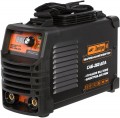Minimum input voltage
The minimum actual input voltage at which the welding machine remains operational.
Such information is useful primarily for working in unstable networks, where the voltage tends to “sag” a lot, as well as from autonomous power sources (for example, generators), which can also produce voltage below the nominal one.
Power consumption
The maximum power consumed by the welding machine during operation, expressed in kilowatts (kW), that is, thousands of watts. In addition, the designation in kilovolt-amperes (kVA) can be used, see below for it.
The higher the power consumption, the more powerful the current the device is capable of delivering and the better it is suitable for working with thick parts. For different materials of different thicknesses, there are recommendations for current strength, they can be clarified in specialized sources. Knowing these recommendations and the open circuit voltage (see below) for the selected type of welding, it is possible to calculate the minimum required power of the welding machine using special formulas. It is also worth considering that high power creates corresponding loads on the wiring and may require connection directly to the shield.
As for the difference between watts and volt-amperes, the physical meaning of both units is the same — current times voltage. However, they represent different parameters. In volt-amperes, the total power consumption is indicated — both active (going to do work and heat individual parts) and reactive (going to losses in coils and capacitors). This value is more convenient to use to calculate the load on the power grid. In watts, only active power is recorded; according to these numbers, it is convenient to calculate the practical capabilities of the welding machine.

